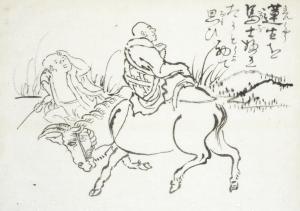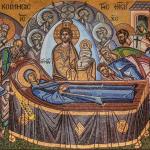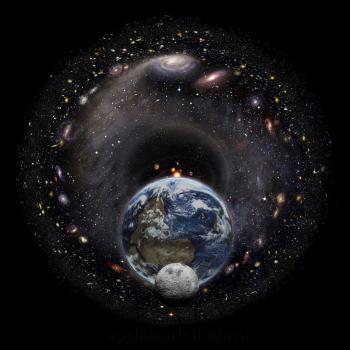
We were made for eternity and yet we find ourselves living in time. This means, there is something important for us to experience in time. We must not ignore our temporal existence. What we do in it is important, for it is in and through our temporal existence we establish who we will be in eternity. This is possible because temporality and eternity are not separate from each other. They are interconnected. And once we realize they are interconnected we should be able to see how rejecting temporal existence leads to a rejection of eternal existence even as neglecting our eternal destiny leads to a distortion and misunderstanding of our temporal existence.
Throughout Christian history, one of the great temptations Christians have had is to deny the value of temporal existence, and with it, material reality (for time and space are interconnected). Many think that the best way to prepare for eternity is to deny the temporal world and all that is connected to it. This error comes from the distortion of a truth which is that we are to deny the world in the sense that we are to deny undue attachments to the world and all that is within it. We are not to deny the world in such a way as to suggest temporal reality is meaningless. God created the world and saw it was good (cf. Gen. 1:31). We must affirm the goodness of creation. Being a part of the temporal order is a part of who and what we are as created beings, and so it is good. And since it is good, we must be able to appreciate and promote that goodness – to do otherwise is to deny what God has decreed as being good. The key is to appreciate the good, to enjoy and support the temporal good without letting it cut us off from the greater good of eternity while at the same time not letting the greater good of eternity cut us off or deny the good found in the temporal order. To deny the goodness of either, or to become overly attached to one or the other, distorts creation and does not allow it to be all that it could and should be. Our temporal existence connects with our eternal existence; what affects one will affect the other. We should try to find a way to perceive those connections, to see the bridge which unites the two, so that we can best act in such a way to live out and experience both realities at once. This is one of many things which we can learn from the incarnation, that it is possible to live out and experience both realities, for we see Jesus does so in his person. And so it should not be surprising that Jesus also taught us this in his earthly ministry, such as when he told us to pray for the presence of God’s kingdom to be revealed on earth as it is in heaven. We pray for the two orders to be so that living in the world and experiencing the world should not divert us from the kingdom of God but should rather be a part of the way we live it out.
The eschaton is immanent even as it is transcendent. God took on human nature and became one of us. The world is not separate from the kingdom of God but it is within it, even as the kingdom of God is within the world. Eternity is not separate from time but penetrates time so that every moment of time presents a snapshot of eternity even as every part of material creation presents its own unique expression of the kingdom of God. Time and space are one. The kingdom of God and the world are one. There is nothing outside of the kingdom of God, even as there is nothing outside of God. All that exists has its existence in God, though it has its own existence, its own freedom so that it must not be confused with God.
We must truly come to realize, not only in thought, but in our experience, that the kingdom of God is within, that creation is good. When we do so, we will understand why we must not deny creation in a nihilistic manner. We can’t disregard it and its goodness. We can’t accept its destruction, for that would be the acceptance of sin and its attempt to counter and destroy the kingdom. And yet, many great saints have told us that we should pick up the cross, deny ourselves, and with such a denial, denial the world as well. We must follow the spirit intended behind their words and not just the words themselves. What they want us to appreciate and understand is that we have established a false sense of the self, and with it, a false sense of the world. This falsehood corrupts all those who follow it, leading them to undue attachments which limit their experience of the kingdom of God. Thus, when various spiritual masters tell us to deny the world, we must understand this as meaning we should deny the covering we impose upon the world through our thoughts and passions, but not the world itself.
That is, to remind us that God loves the world, Christian theology discusses the way the incarnation represents God’s affirmation of the world and its value. God took on material creation, indeed, became a part of the created order and assumed it in such a way to affirm its goodness. We should follow the example of the incarnation. We are to affirm the world and its value so as to reveal the kingdom of God in it even as we follow the path of the cross and deny the false sense of the self-created through our inappropriate and false sense of the world. Once we do so, we will find not only ourselves resurrected in glory, the world itself will be seen in the light of that glory and will be shown to share in that glory. But if the world itself is affirmed, if the world and all created order is shown to be good and to have its share of the glory of the kingdom of God, this means that the incarnation is not just for us. It is for the whole of creation. We must not understand the incarnation as suggesting God only loves us, that is humanity; God loves all creation, When we take up the cross, when we engage proper detachment, and therefore, the affirmation of the world, we will find many things which we thought existed, thanks to our false perception of the world, did not really have any substantial existence. Thus our denial truly is shown to be an affirmation of the world through overcoming of all that would corrupt the world, all the falsehood and delusion which, if embraced, would lead us to hinder creation from being all that it can be. Nonetheless, to embrace this, to counter the delusion, we might, for a time, have to also detach ourselves from various goods in the world, not to deny their value, but to deny our inappropriate means of engaging them. Just as someone who has become unhealthy because they have eaten too much bad food will have to readjust their eating habits to become healthy, so those of us who have an unhealthy relationship with the world must discipline ourselves in order to once again have a healthy engagement with it. This is what asceticism should be about – it should not be about denying the goodness of the world, but about denying the way we misappropriate that good and hinder it from being all it can be because we try to make it all that we want it to be for ourselves alone. Thus, denial of the world is about denial of the false self so as to set the world free to be good as it is, and with it, for us to realize a good place in the temporal (and therefore eternal) order. It is not, and should not ever become, be some ungodly rejection of the world, nihilistically and Satanically hoping to destroy it and all material reality so we can be free spirits without ties to the material world. St. Isaac the Syrian, thus, interpreted the word “world” as representing all the inordinate passions which we must overcome, that is, the false sense of the world we have in and through our inordinate, unholistic attachment to the world and various pleasures within it: “World is a collective noun which is applied to the so-called passions.” [1]
Christianity is often seen as a world denying religion because it points to eternity and eternal life. However, the incarnation shows us that eternal life is not separate from the world. When the incarnation is forgotten, when the union between heaven and earth is forgotten, the temptation to reject the world sometimes leads people astray. Those who follow this false ideology find all kinds of excuses not only to deny the world, but to deny doing good in the world as they think it is all meaningless. Jesus, throughout his ministry, constantly showed us otherwise: he healed the sick, he proclaimed the need for justice for the poor and needy, and he showed that salvation was holistic by healing people both in their body and in their soul. The greatest ascetics understood this as they understood their work was not against the world but their own inordinate way of engaging the world – they prayed for the world and all that is in it even as they found themselves working for those in need (such as the way St. Antony the Great was known to visit those Christians imprisoned for their faith, or the way St. Basil the Great worked to feed the populace during times of famine). They knew that the world itself is not separate from the kingdom of God. Their asceticism was not a rejection of the world, but their means to help them find the proper way to affirm it in their own lives.
We are made for eternity, but eternity is always with us. We are always in eternity. Creation is not separate from it. We are made for eternity and that means we are made for this world. What we must learn to do is to live in the temporal order in such a way as not to ignore its relation to eternity. We must not try to separate the two orders and either live with a vision of eternity which denies the goodness of the temporal order, or enjoy the goodness of the temporal order and the world we live in while ignoring the greater good of the transcendent kingdom of God from which and in which it is found. What we need to do is engage a different mode of being, one which follows the revelation of the incarnation itself, one which allows us to experience eternity while still in the world, so that we, like Jesus, can be in the world, enjoy the goods of the world without being so attached to them we cut ourselves off from the holistic good of the kingdom of God which includes the greater, transcendent reality of eternity.
[1] Saint Isaac the Syrian, The Ascetical Homilies of Saint Isaac the Syrian. Trans. Monks of the Holy Transfiguration Monastery. Rev. 2nd ed (Boston, MA: Holy Transfiguration Monastery, 2011), 125 [Homily 2].
Stay in touch! Like A Little Bit of Nothing on Facebook.
If you liked what you read, please consider sharing it with your friends and family!













